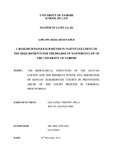| dc.description.abstract | The formal court system in Kenya is firmly entrenched in the Constitution of Kenya, 20101 which, by dint of Article 159(1), vests judicial authority in courts and tribuhals established by or under the Constitution and the principles guiding the courts are set out under Article 159 (2). This research paper contends that every Kenyan court, regardless of its rank in the existing hierarchical structure, has an inescapable legal duty to effectively administer justice and in order to do so, it needs some intrinsic authority to control its own proceedings, safeguard its independence and protect its integrity from abuse. Section 3A of the Civil Procedure Act', empowers every court to make orders as may be necessary for the ends of justice and prevent abuse of the process of the Court. It is ironical that Kenyan Subordinate Courts which try complex criminal cases with harsh penal consequences have a veto power on the prosecution's discretion to discontinue a criminal prosecution' and exercise inherent jurisdiction in civil cases, yet no such inherent power or discretion is attributed to them in criminal proceedings despite the fact that no law or rules of practice and procedure expressly bar or confer Subordinate Courts with such inherent power or discretion. This study is therefore an investigative response to the issue surrounding the exercise of inherent power or discretion by Kenyan Subordinate Courts in criminal proceedings prosecuted before them. The study deals with a falsifiable hypothesis and attempts to address various aims and research questions. It examines the existing literature on the subject and assesses various theories and based on the data collected, arrives at various conclusions. At the tail end, this research paper makes various recommendations to fill identified gaps.
I The Constitution of Kenya, 2010 was promulgated on 27th August, 2010 and published in the Special issue of the Kenya Gazette Supplement No. 55 of201O.
2 Chapter 21 of the Laws of Kenya.
3 See Article 157 (8) of the Constitution of Kenya, 2010. | en_US |

